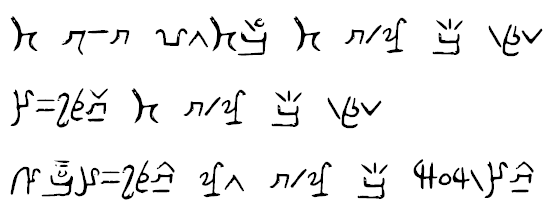I’ve long ago come to terms with the fact that my languages tend to go overboard on the accents. It’s probably because I am a fan of the 1:1 letters:sounds scripts. While sounds have variation it is stupid to assign two completely different sounds to one letter. C.f. c, g, j, s, and many more.
Instead each letter represents a single, specific sound. p̌ represents the /pf/ bi-articulated sound from German found in words like pferd (horse) or, probably more well-known kampf (struggle). Sometimes it makes sense not to bother with a new letter if the difference is extremely minor. The m in mom is actually different from the m in symphony. Say “mom” and your lips come together to start the first /m/. Now start saying symphony and end on the m. Your lips want to come together but you’re already starting the /f/ so your /m/ is articulated slightly differently. This is /ɱ/.
Anyway, I’ve decided to translate a line from my book that would’ve been spoken in Hadysh. It is Einar speaking to Rozenn so it’s extra fun for me to see/hear a line from my book as it should “actually” be written.
P̌a̋f̥arg (masculine noun) – guard
Dual – p̌a̋f̥argr, Plural – p̌a̋f̥args
Object – p̌a̋f̥argẽ
Genitive – p̌a̋f̥argd
Instrument – ap̌a̋f̥argẽ
D’ min þodų. D’ nux á uže fargõ. D’ nux á uže p̌a̋f̥argẽ. Ǩo nux á ž̯utufẽ.
D’ min thoduah. D’ nux ai uzhe fargon. D’ nux ai uzhe pfaufwargen. Kso nux ai dzhutufen.
(Rough spot. Far from the castle. Far from the guard. Not far from trouble.)

